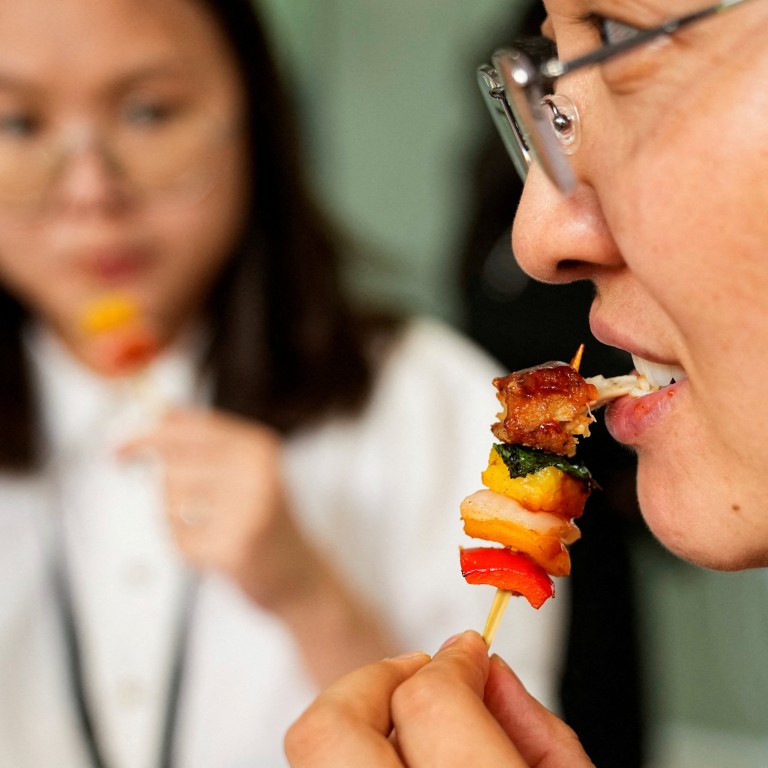
Chinese cultivated meat producer CellX expands to fermentation, eyeing boom in global demand for alternative proteins
- CellX sees huge market for cultivated meat but a fermentation platform makes for faster commercialisation, allowing a quicker route to profits: CEO
- The company is developing protein products based on premium mushroom mycelium, which are also under-utilised and fast-growing superfood ingredients
CellX, a Shanghai-based cultivated meat start-up, is betting biomass fermentation from edible mushrooms will be the next frontier in the alternative protein market, as animal cell-based protein products face uncertain regulatory resistance overseas and amid a longer timeline for large-scale commercialisation.
Cultivated meat is produced by developing a sample of animal cells directly in a lab, without involving animal slaughter. Fermentation-based proteins on the other hand are made from microbial organisms such as yeast, algae, or fungi. The company, which started as a cultivated meat producer, announced its biomass fermentation plans late last year after two years of preparation.
“We see cultivated meat as having a huge potential over the next 10 to 30 years,” CellX’s co-founder and CEO Yang Ziliang told the Post on the sidelines of the One Earth Summit in Hong Kong last week. But he added, “a fermentation platform enables us to go to the market faster and achieve profitability goals much quicker.”
Global demand for alternative proteins is growing rapidly and the pace has accelerated given the urgent need to decarbonise the agriculture and food sectors. In order for Asia to reach net zero emissions, 50 per cent of the region’s protein must be animal-free by 2060, a report by Asia Research Engagement showed.

The market for alternative meat, eggs, dairy, and seafood products is set to reach at least US$290 billion by 2035, according to a report by Boston Consulting Group and Blue Horizon Corporation.
Last November, CellX announced plans to diversify into fermenting mycelium, which is a network of fungal threads, three months after it launched China’s first cultivated meat pilot factory. It plans to sell fermentation-enabled protein products starting next year in the US market, while awaiting approval for selling cultivated meat in the US and Singapore. Yang expects its cultivated meat product will be available for sale in those markets in two years.
Bamboo could be the solution to world hunger as a new source of protein
The company is currently focused on developing protein products based on premium mushroom mycelium, such as truffle, matsutake, and lion’s mane, with plans to partner with downstream consumer goods producers to create new “hybrid” meat or dairy products, Yang said.
“I believe this is a great new source of protein that brings the functional healthy and nutritional benefits from mushrooms” he said.
The pivot comes at a time when cultivated meat developers are facing an increasingly uncertain future globally despite environmental and animal welfare benefits. Several US states, including Florida, Arizona, and some European countries such as France and Italy are proposing a ban on cultivated meat, citing threats to livestock farming and human health.
Last month, Eat Just, a California-based company which claims to be the first company in the world to sell cultivated meat, paused its operations in Singapore, according to a media report which did not specify the reasons for the halt. The report cited an Eat Just spokeswoman who said: “We are evaluating various processing conditions, the unit economics, and a larger strategic approach to producing in Asia.”
Yang sees tremendous potential in the fermentation-enabled protein business. “We see mushrooms as an under-utilised and fast-growing superfood ingredient,” he said while adding that fermentation proteins are easier to scale up for commercialisation and have much lower production costs as compared to cultivated proteins.
CellX aims to reduce the cost of producing fermentation-based proteins to less than US$10 or even US$5 per kilogram, cheaper than animal-based protein and on par with that of plant-based proteins. It is also targeting the markets in the US, Europe, and Singapore, where regulatory approval processes are faster, while also communicating with Chinese authorities to get their nod, said Yang.
Alternative protein has high-level political support in China amid food security and climate challenges. At a joint meeting last March with agriculture, social security, and social welfare political advisers, Chinese President Xi Jinping signalled support for diversification, including sourcing proteins from plant-based and microorganism sources, saying that innovation is key to food security and sustainable development.

